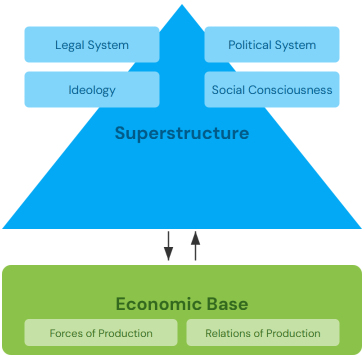Karl Marx: Dialectical and Historical Materialism
Karl Marx: Dialectical and Historical Materialism
Karl Marx’s historical materialism forms the scientific core of his sociological thought, providing a framework for analyzing social change and development. This theory recognizes the essentially social character of human life and seeks to explain how material conditions shape society and drive historical progress.
Philosophical Background:
In Marx’s time, two dominant philosophical approaches grappled with the nature of reality: idealism and materialism. Marx proposed a third way he termed “naturalism” or “humanism,” which considered humans as social animals whose consciousness is shaped by their material conditions.
Key aspects of Marx’s approach:
• Rejection of both extreme idealism and brute materialism
• Criticism of Hegel’s idealistic foundation
• Emphasis on humans as social beings
• Recognition of the interplay between material conditions and consciousness
The Concept of Dialectics:
Central to Marx’s thought is the concept of dialectics, a method of understanding reality as a process of constant change and development through contradictions. Marx applied dialectics to material conditions, arguing that social and economic contradictions drive historical change.
Principles of Marx’s dialectical materialism:
• Each stage of society contains seeds of its own transformation
• Conflicts between social classes or between forces and relations of production lead to new social formations
• Change is driven by the resolution of contradictions
Historical Materialism:
Historical materialism is built on several key postulates that emphasize the relationship between material conditions and social consciousness.
Core principles of historical materialism:
• Social being determines consciousness
• Human beings act collectively to establish means of physical and social reproduction
• Societies develop distinctive structures called modes of production
• Beyond subsistence, societies divide into antagonistic classes
• Productive forces of society tend to grow over time
Economic Structure and Superstructure:
Marx argued that the economic structure of society forms the foundation upon which the political, legal, and cultural superstructure is built.
Key elements of this model:
• Economic base: Relations of production and forces of production
• Superstructure: Political, legal, and cultural institutions
• Changes in the economic base lead to transformations in the superstructure
• The mode of production conditions social, political, and intellectual life processes

Historical Change and Social Revolution:
According to Marx, historical change occurs when new developments in productive forces conflict with existing relations of production.
The process of historical change:
• Contradictions arise between productive forces and relations of production
• People become conscious of the conflict, leading to a period of social revolution
• Resolution of the conflict results in new forces of production and relations
• This process drives the course of human history through various stages (e.g., primitive communism, feudalism, capitalism, socialism)
Capitalist Society and Class Structure:
Marx applied his theory to an analysis of capitalist society, characterized by a fundamental class divide between the bourgeoisie and the proletariat.
Marx’s predictions for capitalist development:
• Increasing concentration of capital in fewer hands
• Higher profits for the bourgeoisie and worsening conditions for the proletariat
• Disappearance of the middle classes
• Polarization of society into two main classes, eventually leading to revolutionary change
Critique and Contributions:
While emphasizing economic factors, Marx rejected simplistic economic determinism. Historical materialism has made significant contributions to sociological theory.
Key contributions:
• Provided a systematic framework for understanding social change
• Emphasized the importance of economic factors in social life
• Highlighted the role of conflict and contradiction in driving historical development
• Introduced the concept of class struggle as a motor of history
Conclusion:
Karl Marx’s theory of historical materialism represents a groundbreaking approach to understanding society and history. By emphasizing the role of material conditions and economic structures in shaping social life, Marx provided a powerful tool for analyzing social change and development. While subsequent scholars have critiqued and refined Marx’s ideas, historical materialism continues to be a significant influence in sociology, economics, and political theory.




